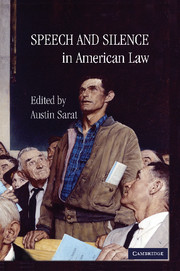Book contents
- Frontmatter
- Contents
- Contributors
- Acknowledgments
- Introduction: Situating Speech and Silence
- 1 “Our Word Is Our Bond”
- 2 Powell's Choice: The Law and Morality of Speech, Silence, and Resignation by High Government Officials
- 3 Anonymous: On Silence and the Public Sphere
- Comment on Chapter 3 Silencing by Exclusion: A Reaction to Anonymous: On Silence and the Public Sphere
- 4 Freedom of Expression, Political Fraud, and the Dilemma of Anonymity
- 5 Speech, Silence, the Body
- Index
- References
Comment on Chapter 3 - Silencing by Exclusion: A Reaction to Anonymous: On Silence and the Public Sphere
Published online by Cambridge University Press: 04 August 2010
- Frontmatter
- Contents
- Contributors
- Acknowledgments
- Introduction: Situating Speech and Silence
- 1 “Our Word Is Our Bond”
- 2 Powell's Choice: The Law and Morality of Speech, Silence, and Resignation by High Government Officials
- 3 Anonymous: On Silence and the Public Sphere
- Comment on Chapter 3 Silencing by Exclusion: A Reaction to Anonymous: On Silence and the Public Sphere
- 4 Freedom of Expression, Political Fraud, and the Dilemma of Anonymity
- 5 Speech, Silence, the Body
- Index
- References
Summary
Most political theorists writing about the public sphere focus, as Professor Allen demonstrates, on “constitutive patterns of speech and communication, not silence.” In her useful corrective to this strand of political thought, Professor Allen turns her attention to “what we learn about the public sphere…by attending to silence.” There can be utter silence (the absence of speech), which communicates equivocal messages: Does someone's silence in response to another's speech signal acquiescence? or instead resistance? There can also be dark, silent speech, a paradoxical phrase that Allen takes from the Antigone to denote anonymous speech.
This dark, silent speech can indicate a disjuncture between the story by the governors and that told by those governed: “the greater the dis-alignment between private beliefs and public accounts, the greater will be the volume of … rumor and gossip spreading in contradiction to the public accounts.” When anonymous speech permits truth to be spoken to power, it serves a valuable function. However, when speech is anonymous, the costs of lying decrease and the risk of untruthful, even calumnious, speech increases. How can society experience the benefit of truthful accusations while avoiding the costs of calumny?
The answer, according to Professor Allen, is recourse to judicial and other adversarial institutions. Any account of the public sphere, she says, must take account of such institutions, and, in particular, how accessible they are. Allen's invocation of adversarial institutions emphasizes their value as truth-finders – institutions that sort calumny from whistleblowing.
- Type
- Chapter
- Information
- Speech and Silence in American Law , pp. 134 - 142Publisher: Cambridge University PressPrint publication year: 2010



